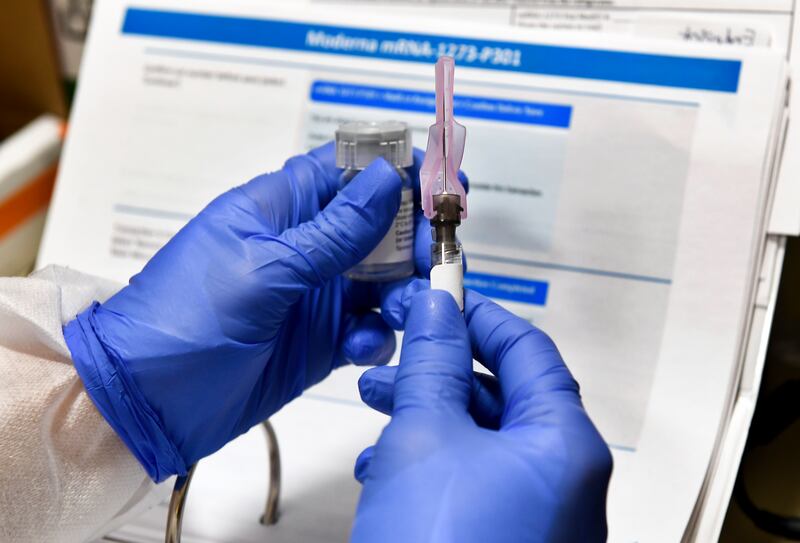A second pharmaceutical company said Monday it would ask for government approval of its COVID-19 vaccine after it was shown to be highly effective and had been able to stave off severe cases of the coronavirus.
Moderna Inc. announced that a clinical trial had shown its vaccine — named mRNA-1273 — had an efficacy of 94.1% and had been able to prevent 100% of “severe” cases of the pandemic disease, the company claimed in a statement Monday.
The company also announced it would be applying for an emergency use authorization from the U.S. Food and Drug Administration — making its vaccine the second to ask the government for emergency approval to begin distribution to the American public. It was also asking for approval from the European Medicines Agency — a medical supervisory agency of the European Union.
Emergency use authorizations, known as EUAs, are formal approvals by the FDA for a previously unapproved or undeveloped medical product to be used during a national disaster.
On Nov. 20, Pfizer and BioNTech — the first company to announce successful vaccine study results — applied for FDA authorization of their COVID-19 vaccines.
The FDA’s advisory committee will review both of the applications in December, CNN reported.
If the vaccine is approved, the first of two doses — which would be administered about a month apart — could begin as early as Dec. 21, a Moderna spokesperson told The New York Times.
Although the federal and state governments agree that health care workers — around 21 million professionals — should receive the first available doses, President Donald Trump’s administration has said that state officials will have “ultimate authority” for assigning vaccine priority, Politico reported.
What to know about the vaccines:
- Both Moderna’s and Pfizer’s vaccines are mRNA vaccines, which means that unlike the annual flu vaccine or some childhood vaccines, they don’t contain any live or dead novel coronavirus and cannot give you COVID-19. Instead, they contain genetic instructions that tell your body to make a harmless spike protein — the same protein the novel coronavirus uses to attack healthy cells. This triggers an immune response that prepares your body to respond should an actual novel coronavirus encounter occur.
- While the vaccine will not give you COVID-19, and no serious side effects have been noted, some have reported mild to moderate effects following vaccination, including injection site pain, fatigue, muscle pain, joint pain and headache, according to the Moderna report.
- Both vaccines require two doses, given either 21 or 28 days apart.
- Despite optimism from public health officials, Moderna notes “the forward-looking statements in this press release are neither promises nor guarantees,” while Pfizer outlines in a lengthy paragraph the “substantial risks and uncertainties that could cause actual results to differ materially from those expressed or implied by such statements.”
The caution refers to technology still being developed, the FDA has never approved mRNA vaccine, the findings are still not peer-reviewed and significant supply chain and distribution issues could arise.
Moderna
- In addition to announcing efficacy, Moderna also announced Monday its vaccine will remain stable for 30 days in a standard home or medical refrigerator — a time-frame increase from an earlier estimate of a week of refrigeration. In a freezer below -20 degrees C (-4 degrees F) the vaccine could remain stable for up to six months. Once taken out of the refrigerator to administer, the vaccine will remain stable for up to 12 hours, according to a company release.
- Moderna’s study pool is 30,000 people ages 18 and older. Of that pool, 25,654 have received their second vaccination, according to Deseret News reporting from Nov. 16. The pool includes more than 7,000 Americans over the age of 65, plus 5,000 people who are medically high-risk (diabetes, severe obesity and cardiac disease). It also includes 11,000-plus participants from communities of color, with more than 6,000 people who identify as Hispanic or LatinX and more than 3,000 who identify as Black or African American.
- Moderna is part of Operation Warp Speed, the federal government’s program to fast-track a COVID-19 vaccine, and has received more than $955 million to aid in vaccine development. In August, the government also contracted to buy 100 million doses of the Moderna vaccine for $1.5 billion, with the option to buy more.
Pfizer
- Pfizer was not part of Operation Warp Speed; however, in July the U.S. government bought 100 million doses of the Pfizer vaccine for $1.95 billion — with the potential to buy 500 million more, according to a company press release earlier this summer. In that release, Pfizer also indicated that Americans would receive the vaccine for free, “consistent with the U.S. government’s commitment for free access for COVID-19 vaccines.”
- Pfizer’s phase 3 clinical trial data came from more than 43,000 people worldwide, among whom 38,955 have received a second dose of the vaccine candidate as of Nov. 8. Of these, 42% of global participants and 30% of US participants have racially and ethnically diverse backgrounds.
- Pfizer and BioNTech are continuing to enroll participants in their study until they reach a total of 164 confirmed COVID-19 cases. They will also study if the vaccine is effective for those who have already had COVID-19. All participants will be monitored for two years after the second dose to gauge long-term efficacy and any safety issues.
- Pfizer and BioNTech’s mRNA vaccine requires extensive cold-chain storage at -70 degrees C (-94 degrees F) and will be shipped in special insulated containers using dry ice that must be replenished every few days.



